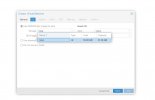Hi I am very new to proxmox and have the following setup:
2x 60gb ssd enterprise drives in zfs raid 1 where proxmox is installed that shows up as local and local-zfs - here I can create vm's without an issue, the problem of course being there is very little space. So I added 2x 900gb scsi 15k drives in a zfs raid 1. My intention was to install my vm's on this. However after creating the pool and selecting create virtual machine. the storage dropdown only lets me choose "local" it will not let me select my zfs pool.
Output of storage config:
dir: local
path /var/lib/vz
content backup,vztmpl,iso
zfspool: local-zfs
pool rpool/data
content images,rootdir
sparse 1
zfspool: Storage1
pool Storage1
content images,rootdir
mountpoint /Storage1
sparse 0
2x 60gb ssd enterprise drives in zfs raid 1 where proxmox is installed that shows up as local and local-zfs - here I can create vm's without an issue, the problem of course being there is very little space. So I added 2x 900gb scsi 15k drives in a zfs raid 1. My intention was to install my vm's on this. However after creating the pool and selecting create virtual machine. the storage dropdown only lets me choose "local" it will not let me select my zfs pool.
Output of storage config:
dir: local
path /var/lib/vz
content backup,vztmpl,iso
zfspool: local-zfs
pool rpool/data
content images,rootdir
sparse 1
zfspool: Storage1
pool Storage1
content images,rootdir
mountpoint /Storage1
sparse 0




